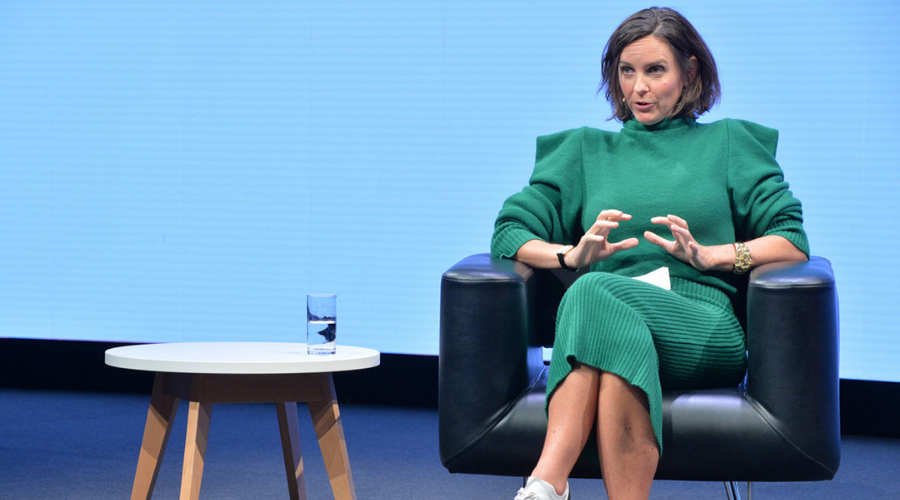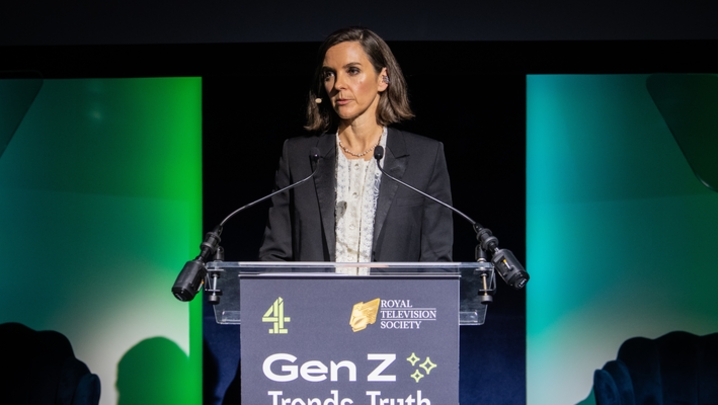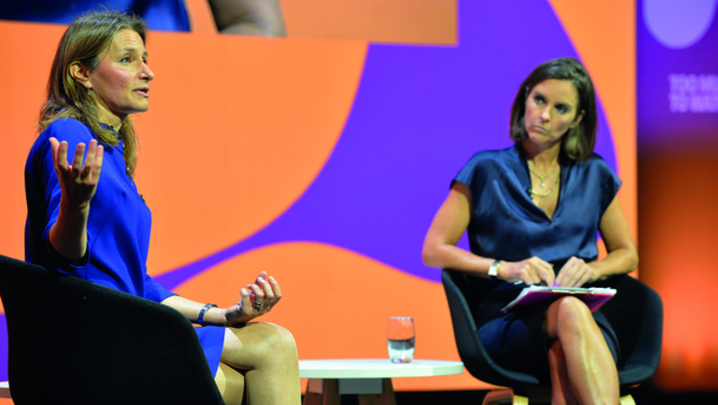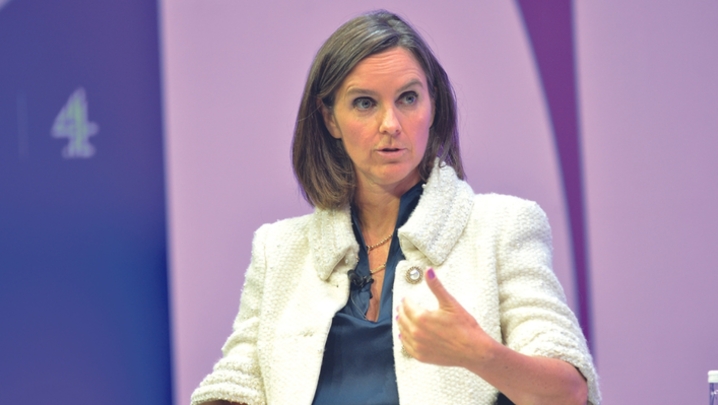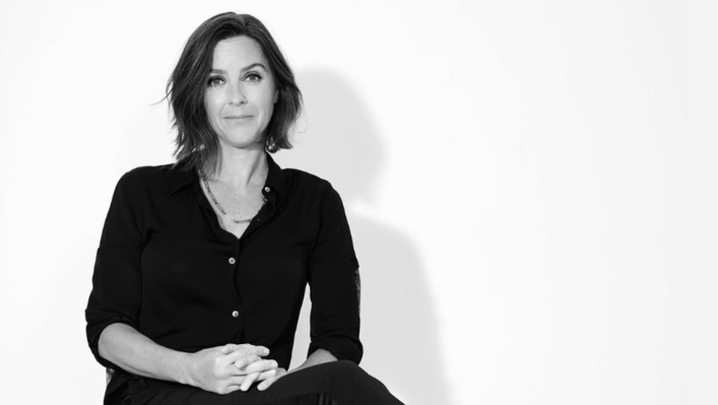The Channel 4 CEO lays out the case against privatisation and argues that her channel is prospering without a new investor.
The decision on whether to privatise Channel 4 should be based on “data and evidence” and not, by implication, on ideology, Alex Mahon told the audience gathered in Cambridge. The broadcaster’s CEO was speaking shortly before Government minister John Whittingdale – a last-minute stand-in for his reshuffled colleague Oliver Dowden – was due to address the RTS Convention.
Mahon’s appearance in Cambridge came a day after the consultation on Channel 4’s future closed. The Government is considering changes to the channel’s operating model, including its ownership, remit and obligations. Its preferred option is privatisation, which it claims will safeguard the broadcaster’s future in an increasingly competitive media landscape.
Mahon – who referred to her tenure at Channel 4 as a “not-as-easy-as-I-thought-it-might-be job” – accepted that it was entirely right and proper that the Government should examine the status of Channel 4 periodically, adding that “there were areas of agreement with the Government. We want Channel 4 to be protected for the future and stronger for the future. That’s a shared objective with the Government….
“I don’t want Channel 4 to stand still – none of us do. In fact, I’d argue we’re moving faster than plenty of other broadcasters in the world.”
Channel 4 and the Government parted ways, however, over proposed privatisation: “There is no data and no evidence, as yet, that Channel 4 would be more able to sustain its mission and remit, its delivery of social impact, and support of the indies and the creative community in 10 years if it was in private hands.”
Mahon argued that much of Channel 4’s current programming wouldn’t be commercially sustainable if the broadcaster were privatised. This included its much-praised coverage of the Paralympics “at the scale we do it at”, and its coup in landing the rights to show British tennis player Emma Raducanu’s remarkable triumph in the women’s final at the US Open.
In a last-minute deal, Channel 4 paid Amazon Prime a seven-figure sum and was amply rewarded by huge ratings, with audiences peaking at 9.2 million for the final. Of Raducanu, Mahon joked: “She’s young, she’s diverse, she’s fighting against the odds – sometimes that feels like being Channel 4.”
Mahon identified shows that a private-sector broadcaster would not have been able to make, including Russell T Davies’s award-winning drama It’s a Sin, set during the Aids crisis in the 1980s, which had been “rejected by every commercial broadcaster”.
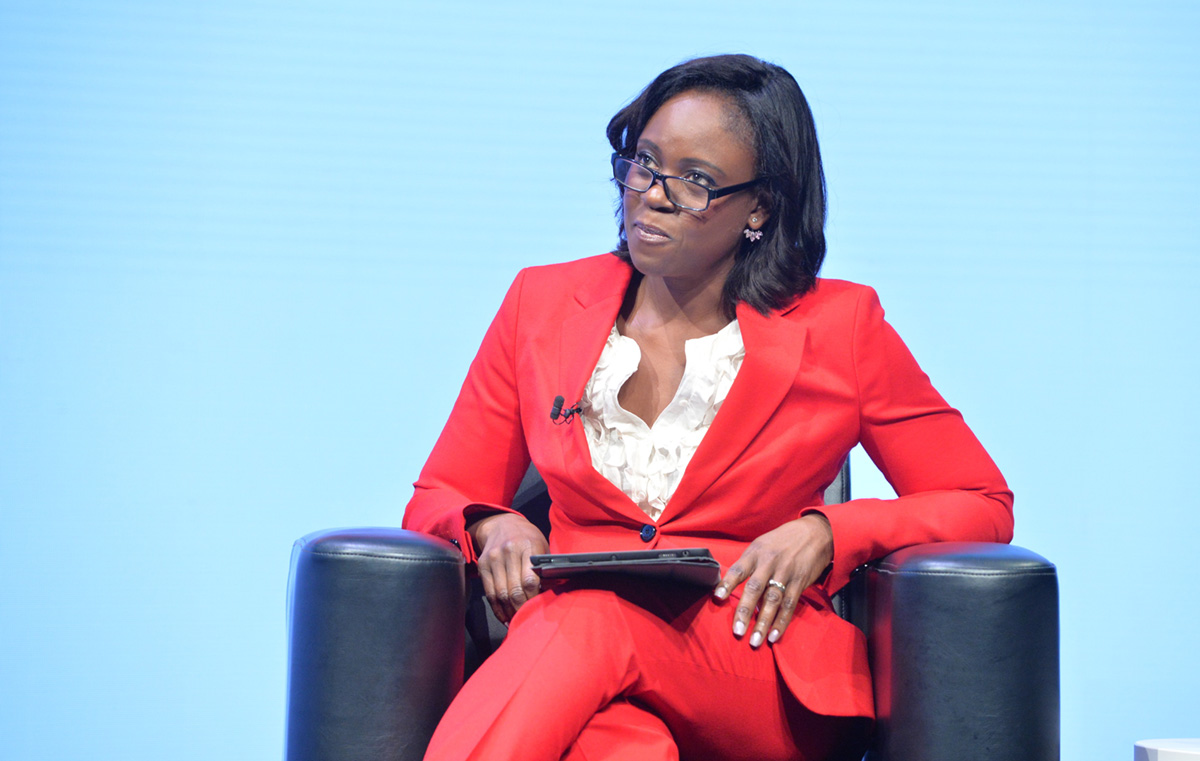
Channel 4’s recent Black to Front day, which championed black talent both on and off camera, was another initiative that wouldn’t have made it to screen. “It is now obvious to everyone that there is talent out there,” she said.
Mahon also said that “shows which put public purpose and social impact at their heart” wouldn’t get made because “they’re not necessarily profitable right away”.
She added: “You wouldn’t break new talent…. The streamers go and get established talent; they leave it to people like us to go and break them.
“And you certainly wouldn’t put loads of money and loads of offices and loads of jobs all over the UK outside of London, and support the creative sectors in all those areas.”
Offering evidence that Channel 4 was not “standing still”, Mahon highlighted the broadcaster’s advances in digital services. “The biggest transition by far for us, and for any broadcaster that is advertiser-funded, is to move to digital. The audience is all viewing streaming; people want to watch stuff when they want to watch it, where they want to watch it.”
Mahon claimed Channel 4 was rapidly turning digital: “Our revenues will grow 19% this year – this is not a business that’s in trouble. Our digital revenues will grow 32% this year. We’re in really good shape.”
Since it was launched almost 40 years ago, Channel 4 – which is not allowed to make its own content – has become a linchpin for UK producers, in particular, start-ups and small indies.
“We earn about £1bn a year, we spend about £1bn a year – the vast majority of that money is spent on small businesses across the UK,” said Mahon, who added that the “impact [of privatisation] would be felt in the independent community.
“Part of our job is to build the creative economy and the creative clusters across the UK and that means we take pitches from everybody…. It’s the nurturing of the small and the medium that brings new voices into the industry.”
Mahon also claimed that the broadcaster’s focus on regional production – exemplified by its Leeds HQ and creative hubs in Bristol and Glasgow – would be put at risk.
The Channel 4 chief was positive about the broadcaster’s prospects, assuming it was allowed to retain its current operating model: “We’re financially sustainable…. Advertising is having a massive resurgence, television is doing very well.”
Channel 4’s priorities would be to “continue to switch to digital, keeping us as the young people’s broadcaster – that’s what we’re really successful at – and then making sure we partner with people.… We’ve always been too small to do everything on our own.” The US Open deal with Amazon Prime was a shining example of the latter, said Mahon.
Sky News breakfast anchor Gillian Joseph, who was interviewing Mahon at the Convention, suggested that Channel 4 could find itself squeezed out by the rise and rise of the US streaming giants. “There’s definitely space [for us] because people are spending more on media and viewing more media. They’re not easy competition, they’re not easy competition for any of us, but we’ve all been competing with them successfully,” replied Mahon.
“There is a particular appetite in the UK for British content, for British brands… [and] for strong public service media – and that will continue.”
Session Nine: ‘UK Keynote: Alex Mahon’. The Channel 4 CEO was in conversation with Sky News presenter Gillian Joseph. The session was produced by Sue Robertson and Martin Stott. Report by Matthew Bell.

